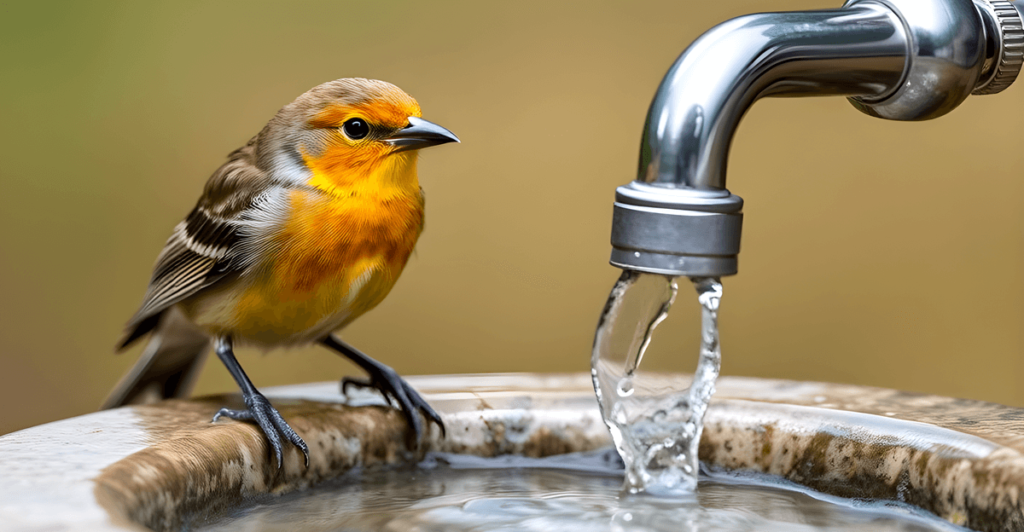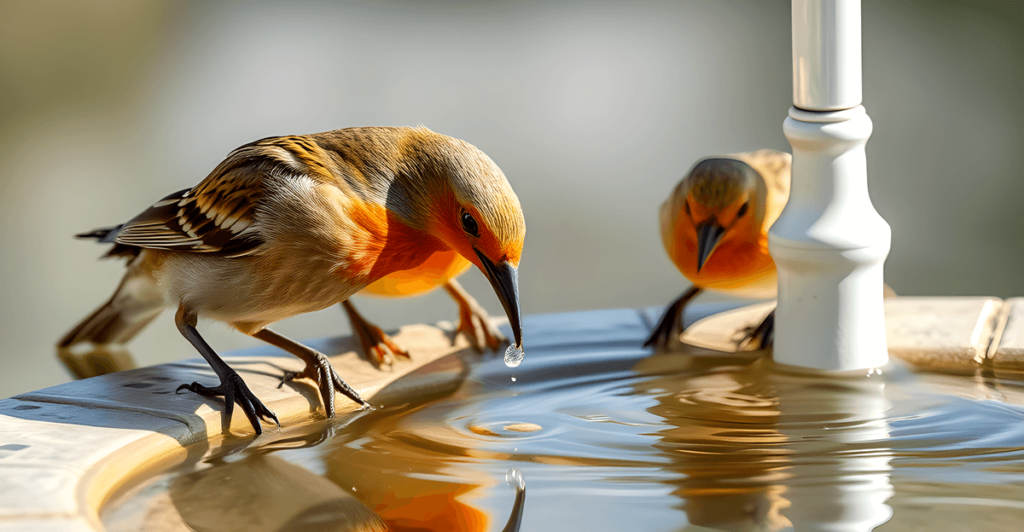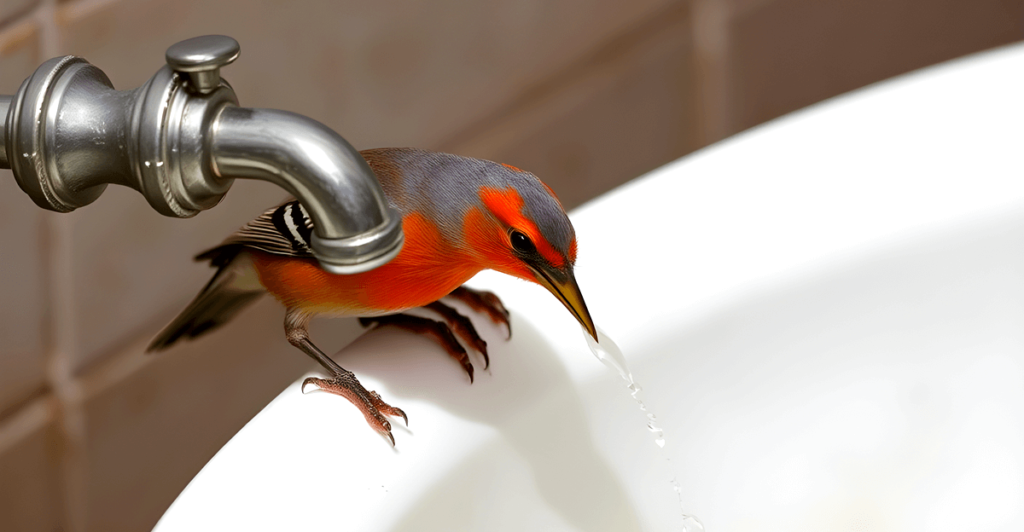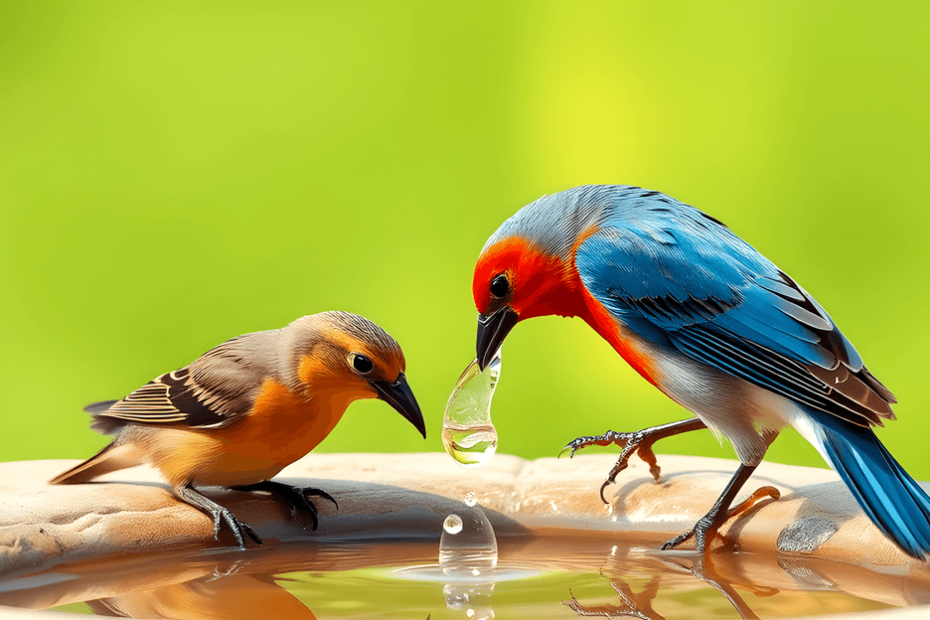Introduction
As an avid bird enthusiast and long-time avian veterinary assistant, I’ve spent countless hours observing and caring for a wide variety of birds. One question that frequently comes up among both novice and experienced bird owners is: Can birds drink tap water? This seemingly simple question actually opens up a complex topic that’s crucial for the health and well-being of our feathered friends. In this comprehensive guide, I’ll share my personal experiences and expert knowledge to help you understand everything you need to know about birds and tap water.
Understanding Bird Hydration: A Critical Factor in Avian Health
Before we dive into the specifics of tap water, it’s essential to understand why water is so crucial for birds. In my years of working with birds, I’ve seen firsthand how proper hydration can make a dramatic difference in a bird’s health and vitality. Birds rely on water for a multitude of bodily functions, including regulating body temperature, digesting food, transporting nutrients, and flushing out waste products. Dehydration can lead to a range of health problems, including lethargy, weakness, feather loss, and even organ damage. Avian species, with their diverse metabolisms and lifestyles, each have unique hydration needs, making it crucial for bird owners to understand the specific requirements of their feathered companions. This knowledge empowers us to provide the best possible care, ensuring their well-being and longevity.
The Importance of Water for Birds
Water plays a vital role in nearly every bodily function of a bird. From my observations, I can tell you that birds use water for:
- Maintaining body temperature
- Aiding in digestion
- Flushing out toxins
- Keeping feathers clean and healthy
- Supporting overall organ function
I once cared for a dehydrated cockatiel that came into our clinic. The difference in its behavior and appearance after just a day of proper hydration was remarkable. Its eyes became brighter, its feathers more vibrant, and its energy levels noticeably improved.
Can Birds Drink Tap Water?
In nature, birds have adapted various methods to consume water. During my birdwatching expeditions, I’ve observed:
- Scooping: Many birds, like pigeons and doves, use their beaks as straws, scooping up water and then tilting their heads back to swallow.
- Dipping: Swallows and swifts often skim the surface of water bodies, dipping their beaks to drink while in flight.
- Licking: Some birds, particularly nectar-feeders like hummingbirds, use their specialized tongues to lap up water droplets.
Water Requirements for Different Bird Species
Through my work, I’ve learned that water needs can vary significantly between species. Here’s a general guide based on my experience:
| Bird Size | Daily Water Intake |
|---|---|
| Small (e.g., Finch) | 1-2 ml |
| Medium (e.g., Cockatiel) | 5-10 ml |
| Large (e.g., Macaw) | 20-30 ml |
Remember, these are rough estimates. Factors like climate, diet, and activity level can all influence a bird’s water requirements.

Tap Water for Birds: Safety Considerations
Now, let’s address the central question: Can birds drink tap water? The quick answer is “yes,” but there are several crucial limitations. While tap water is readily available and convenient, it’s crucial to understand the potential risks and take steps to ensure the safety of our avian companions. Tap water often contains chlorine, fluoride, and other chemicals that, while safe for human consumption, can be harmful to birds in high concentrations. These contaminants can disrupt their delicate digestive systems, leading to health issues. Additionally, the mineral content of tap water can vary depending on location, and some minerals can be detrimental to avian health. Therefore, while tap water can be a viable option for bird hydration, it’s essential to prioritize safety and implement measures to minimize potential risks.
My Personal Experience with Tap Water and Birds
In my own aviary, I initially used tap water for my birds without much thought. However, after noticing some subtle changes in their behavior and consulting with more experienced colleagues, I decided to investigate further.
Composition of Tap Water
Tap water typically contains:
- Minerals (calcium, magnesium, sodium): These minerals are essential for human health, but their high concentration in tap water can be detrimental to birds, particularly those with sensitive digestive systems.
- Disinfectants (chlorine or chloramine): These chemicals are added to tap water to kill harmful bacteria. While safe for humans, they can be irritating to a bird’s respiratory system and can potentially damage their delicate skin and feathers.
- Fluoride (in some regions): Fluoride is added to tap water to strengthen teeth, but in excess, it can cause skeletal problems in birds.
- Trace amounts of other elements: Tap water may contain trace amounts of heavy metals, pesticides, and other contaminants, depending on the source and treatment process. These contaminants can accumulate in the bird’s body over time and lead to various health problems.
While these components make water safe for human consumption, they can potentially affect birds differently, highlighting the need for careful consideration when providing tap water to our feathered friends.
Potential Contaminants in Tap Water
During my research and consultations with water quality experts, I learned about several contaminants that could be present in tap water:
- Heavy metals: Lead, copper, and zinc can leach from old pipes.
- Pesticides and herbicides: These can enter the water supply from agricultural runoff.
- Pharmaceuticals: Trace amounts of medications can sometimes be found in tap water.
- Microorganisms: While usually eliminated by treatment, some bacteria or parasites may survive.
Comparing Tap Water to Natural Water Sources
In my birdwatching trips, I’ve observed wild birds drinking from various natural sources. While these sources aren’t necessarily “pure,” birds have evolved to handle certain levels of natural contaminants. Tap water, on the other hand, contains additives that birds wouldn’t encounter in nature.
Factors Affecting Tap Water Safety for Birds
Through my research and discussions with water treatment professionals, I’ve learned that several factors can influence the safety of tap water for birds:
- Water Source and Treatment: The source of tap water and the treatment process used can significantly impact its safety for birds. Water from different sources, such as rivers, lakes, or wells, can have varying mineral content and levels of contaminants.
- Location: The geographic location can influence the quality of tap water. Areas with high levels of mineral content or industrial pollution may have tap water that is unsuitable for birds.
- Season: Seasonal variations in weather and water treatment practices can affect the composition and safety of tap water.
- Bird Species: Different bird species have varying sensitivities to contaminants. Some birds, particularly those with specialized diets or delicate digestive systems, may be more susceptible to the effects of tap water contaminants.
- Individual Bird Health: The overall health of a bird can influence their ability to tolerate tap water contaminants. A bird that is already weakened or stressed may be more prone to health problems from tap water.
Understanding these factors is crucial for making informed decisions about providing tap water to birds. It’s essential to consider the specific needs of your bird and the local water quality when making choices about hydration.
Water Treatment Methods
Different municipalities use various methods to treat water, including:
- Chlorination
- Chloramination
- UV disinfection
- Ozonation
Each method can affect water quality differently. For example, I noticed that when our local water treatment facility switched from chlorine to chloramine, some of my more sensitive birds showed signs of mild respiratory irritation.
Regional Differences in Water Quality
The quality of the water might differ greatly depending on where you live. In my travels, I’ve noticed that birds in areas with naturally hard water often have stronger beaks and bones, likely due to the higher mineral content in their water.
Age and Condition of Plumbing Systems
Older homes with lead pipes or copper plumbing can introduce contaminants into otherwise safe water. When I moved my aviary to an older building, I made sure to have the water tested and installed appropriate filters to ensure my birds’ safety.

Potential Risks of Tap Water for Birds
Based on my experience and research, here are some of the main concerns with giving tap water to birds:
Chlorine and Chloramine
While these disinfectants make water safe for humans, they can irritate birds’ sensitive respiratory systems. I once cared for a canary that developed respiratory issues from chlorine exposure, which resolved after switching to filtered water.
Heavy Metals
Birds are particularly sensitive to heavy metals. In severe cases, I’ve seen birds develop neurological symptoms from lead exposure through contaminated water.
Fluoride
The debate on fluoride safety for birds is ongoing. While I haven’t seen direct evidence of harm in my birds, some avian specialists recommend avoiding fluoridated water, especially for smaller species.
Microorganisms and Bacteria
Although rare in treated water, pathogens can be devastating to birds if present. I always err on the side of caution and use filtered or boiled water for my most vulnerable birds.
Alternatives to Tap Water for Birds
Through trial and error, I’ve explored several alternatives to tap water for my birds:
Filtered Water
My top recommendation is using a high-quality water filter. I use a reverse osmosis system for my aviary, which removes most contaminants while leaving beneficial minerals.
Bottled Spring Water
While convenient, I found this option to be expensive for daily use. However, it’s a good choice when traveling with birds.
Rainwater Collection
In areas with clean air, collected rainwater can be an excellent option. I use this method for my outdoor aviaries, but I always filter and test it before use.
Pros and Cons of Each Alternative
| Water Source | Pros | Cons |
|---|---|---|
| Filtered | Removes contaminants, cost-effective long-term | Initial investment in equipment |
| Bottled Spring | Convenient, consistent quality | Expensive, environmental concerns |
| Rainwater | Free, natural | Requires collection system, potential contamination |
How to Make Tap Water Safe for Birds
If you decide to use tap water, here are some methods I’ve used to make it safer:
Water Filtration Systems
I highly recommend investing in a good filtration system. Options include:
- Activated carbon filters
- Reverse osmosis systems
- UV sterilizers
Letting Tap Water Sit
A simple method I use for chlorine (but not chloramine) is letting water sit out for 24 hours. This allows most of the chlorine to evaporate.
Boiling Tap Water
For small quantities, I sometimes boil water and let it cool. This eliminates most pathogens but doesn’t remove chemical contaminants.
Best Practices for Providing Water to Pet Birds
Based on my years of experience, here are my top tips for keeping your birds well-hydrated:
Choosing the Right Water Containers
I prefer stainless steel or ceramic bowls as they’re easy to clean and don’t harbor bacteria. Avoid plastic, which can leach chemicals.
Cleaning and Maintaining Bird Water Sources
I clean my birds’ water bowls daily with a mild, bird-safe disinfectant. Deep cleaning weekly helps prevent algae growth.
Frequency of Water Changes
I change my birds’ water at least twice daily, more often in hot weather or if the bird bathes in its water dish.
Wild Birds and Tap Water: Birdbath Considerations
For those who enjoy attracting wild birds to their yards, here’s what I’ve learned about using tap water in birdbaths:
Using Tap Water in Birdbaths
Generally, tap water is okay for birdbaths. The large volume and constant movement reduce risks from contaminants.
Maintaining Clean Birdbaths
I clean my birdbaths every few days with a stiff brush and rinse thoroughly. Avoiding soap prevents residue that could harm birds.
Alternative Water Sources for Outdoor Bird Care
Consider installing a small pond or water feature with a filtration system for a more natural water source.
Monitoring Your Bird’s Water Intake
Observing your bird’s water consumption is crucial. Here’s what I look for:
Signs of Dehydration in Birds
- Sunken eyes
- Dry, wrinkled skin around the eyes
- Thick, stringy saliva
- Lethargy
How to Encourage Proper Hydration
- Provide fresh water daily
- Offer water in different containers or locations
- Use a dripper or fountain to create movement
When to Consult a Veterinarian
If you notice any signs of dehydration or changes in water consumption, consult an avian vet immediately. I once saved a client’s bird by recognizing early signs of dehydration and recommending prompt veterinary care.

Frequently Asked Questions About Birds Drinking Tap Water
Through my years of experience, these are the most common questions I encounter:
Can birds taste differences in water?
Yes, birds have taste buds and can detect differences in water quality. I’ve observed my own birds showing preferences for certain water sources.
Do birds prefer certain types of water?
In my experience, many birds seem to prefer moving water. I’ve had success using small fountains in my aviaries.
How long can birds go without water?
This varies by species, but generally, small birds can become seriously dehydrated within 24 hours without water. Always ensure constant access to fresh water.
Can birds drink other liquids besides water?
While birds can consume some other liquids, water should be their primary drink. I’ve seen cases of nutritional imbalances from birds given too much fruit juice or other unsuitable liquids.
Conclusion
After years of caring for birds and researching this topic, I can confidently say that while birds can drink tap water, it’s crucial to consider the potential risks and take steps to ensure the water is as safe as possible. Here are my key takeaways:
- Always provide fresh, clean water daily.
- Consider using a high-quality water filter, especially for smaller or more sensitive bird species.
- Monitor your bird’s water intake and watch for signs of dehydration.
- When in doubt, consult with an avian veterinarian about the best water options for your specific birds.
Remember, proper hydration is fundamental to your bird’s health and happiness. By paying attention to their water quality, you’re taking a significant step in providing the best care possible for your feathered friends.
Additional Resources
For those looking to delve deeper into this topic, I recommend the following resources:
- “Avian Medicine: Principles and Application” by Ritchie, Harrison, and Harrison
- The Association of Avian Veterinarians website (www.aav.org)
- Your local water quality report (usually available from your municipal water supplier)
By staying informed and attentive, you can ensure that your birds have access to safe, clean water, contributing to their overall health and well-being. As a bird lover, there’s nothing more rewarding than seeing your feathered companions thrive under your care.
